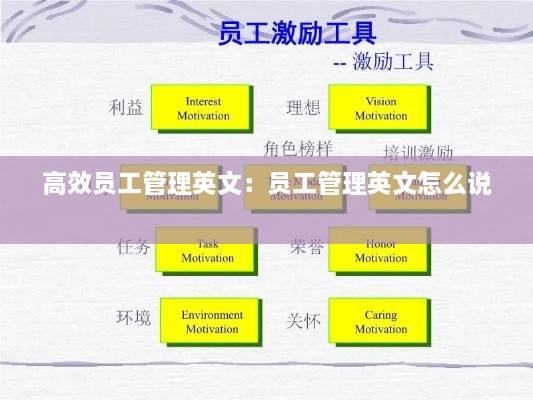Introduction to Effective Employee Management
Effective employee management is a critical component of any successful organization. It involves creating a work environment that not only fosters productivity but also promotes employee satisfaction and retention. In this article, we will explore various strategies and best practices for managing employees efficiently, ensuring that they contribute positively to the company's goals and objectives.
Understanding Employee Needs
One of the first steps in effective employee management is understanding the needs and expectations of your team members. This involves regular communication and feedback sessions to identify what motivates them, what challenges they face, and what support they require. By tailoring your management approach to individual needs, you can create a more engaged and productive workforce.
Communication is Key
Open and transparent communication is essential for effective employee management. Regular team meetings, one-on-one discussions, and feedback forums can help build trust and ensure that everyone is on the same page. Managers should also encourage a culture of open dialogue, where employees feel comfortable sharing their ideas and concerns.
Understanding Motivations
Each employee is motivated by different factors. Some may be driven by financial rewards, while others may be motivated by recognition or career development opportunities. By understanding these motivations, managers can create personalized incentive programs that keep employees engaged and committed to their work.
Setting Clear Expectations and Goals
Clarity in expectations and goals is crucial for efficient employee management. Managers should clearly define the roles and responsibilities of each team member and set achievable goals that align with the company's objectives. This helps in aligning individual efforts with the broader organizational strategy.
SMART Goals
Setting SMART (Specific, Measurable, Achievable, Relevant, Time-bound) goals can provide a clear roadmap for employees. These goals should be realistic and challenging enough to inspire growth and development, but also attainable to prevent demotivation.
Regular Check-Ins
Regular check-ins with employees can help monitor progress towards goals and provide an opportunity for feedback. This allows managers to offer support and guidance when needed, ensuring that employees stay on track and are aware of their performance relative to the set goals.
Empowering and Trusting Employees
Empowerment and trust are key factors in effective employee management. By giving employees the autonomy to make decisions and take ownership of their work, managers can foster a sense of responsibility and accountability. This approach also encourages innovation and creativity within the team.
Delegation of Responsibilities
Delegating tasks effectively is an essential skill for managers. By assigning responsibilities based on employees' strengths and abilities, managers can not only distribute workload efficiently but also provide opportunities for growth and development.
Support and Resources
Employees need the necessary support and resources to perform their tasks effectively. Managers should ensure that team members have access to the tools, training, and information they need to succeed in their roles.
Performance Management and Feedback
Regular performance evaluations and constructive feedback are vital for effective employee management. These evaluations should be based on clear criteria and should provide an opportunity for employees to reflect on their progress and set new goals.
Constructive Feedback
Feedback should be specific, constructive, and focused on both strengths and areas for improvement. By providing employees with actionable advice, managers can help them grow and develop in their roles.
Recognition and Rewards
Recognition and rewards for a job well done are powerful motivators. Managers should acknowledge and celebrate achievements, whether through formal awards, bonuses, or simple gestures of appreciation.
Building a Positive Work Culture
A positive work culture is essential for employee satisfaction and retention. Managers should focus on creating an inclusive, supportive, and respectful environment where employees feel valued and empowered.
Inclusive Communication
Inclusive communication ensures that all team members feel heard and respected. Managers should be mindful of different communication styles and preferences, and strive to create an environment where everyone has a voice.
Work-Life Balance
Supporting work-life balance is crucial for employee well-being and productivity. Managers should encourage a healthy balance between work and personal life and provide flexibility where possible.
Conclusion
Effective employee management is a multifaceted process that requires a combination of understanding, communication, and strategic planning. By focusing on employee needs, setting clear expectations, empowering team members, and fostering a positive work culture, managers can create a high-performing workforce that drives the success of the organization.
转载请注明来自陵县立信制衣有限公司,本文标题:《高效员工管理英文:员工管理英文怎么说 》











 蜀ICP备2022005971号-1
蜀ICP备2022005971号-1
还没有评论,来说两句吧...